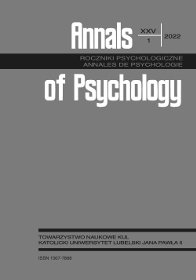Sleep Quality and the Level of Perceived Stress in Medical Students
Sleep Quality and the Level of Perceived Stress in Medical Students
Author(s): Bartosz Bagrowski, Joanna GutowskaSubject(s): Social Sciences, Psychology, Sociology, Personality Psychology, Health and medicine and law
Published by: Towarzystwo Naukowe KUL & Katolicki Uniwersytet Lubelski Jana Pawła II
Keywords: circadian rhythm; sleep disturbances; sleep quality; stress level; sympathetic nervous system
Summary/Abstract: Sleep is a very important aspect of human life, as it is responsible for regulation of the circadian cycle, body regeneration and reduction of harmful metabolites. Sleep deprivation can be associated with chronic stress, which can have an extremely negative impact on bodily function. The presented study covered 220 students of medical faculties; their correlations between the sleep quality and the level of perceived stress were analyzed. Sleep quality was measured using the PSQI (Pittsburgh Sleep Quality Index), and perceived stress was measured using PSS-10 (10-Item Perceived Stress Scale). A high correlation was shown between the PSQI and PSS-10 results (rs = 0.60), which means that people who were characterized by a low sleep quality also showed a high level of perceived stress. Among the PSQI components that were the most correlated with PSS-10, can be counted in such components as C1 (subjective sleep quality, rs = 0.50), C2 (sleep latency, rs = 0.51), and C7 (daytime dysfunctions, rs = 0.52). Mobile phone usage at bedtime has also been demonstrated to correlate with poor sleep quality. The study shows a significant relationship between sleep quality and the level of perceived stress, which has also been shown in other studies.
Journal: Roczniki Psychologiczne
- Issue Year: 25/2022
- Issue No: 1
- Page Range: 87-98
- Page Count: 12
- Language: English

